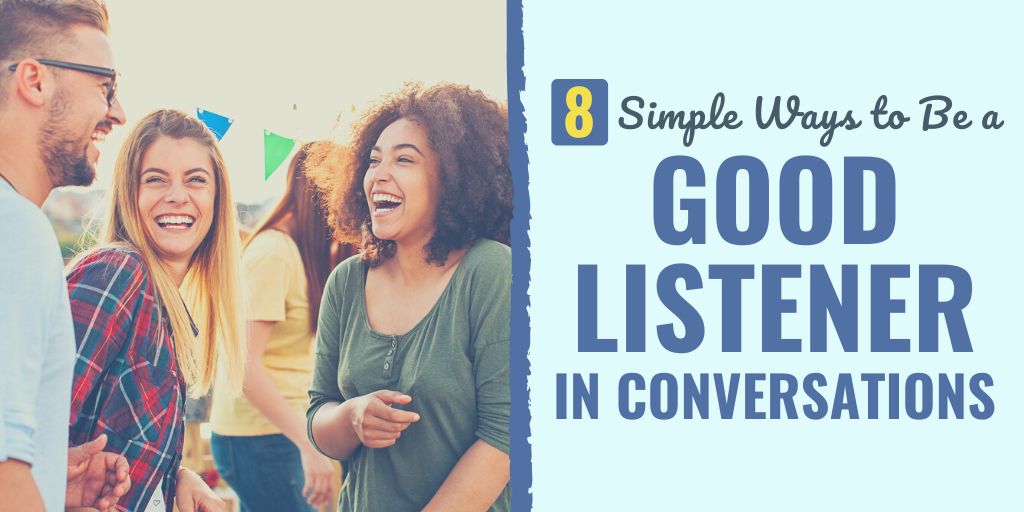There might be affiliate links on this page, which means we get a small commission of anything you buy. As an Amazon Associate we earn from qualifying purchases. Please do your own research before making any online purchase.
There is a direct connection between the quality of the conversations that we have and the quality of our relationships.
Having confidence in your conversation skills can help you get to know a new client, mentor, or friend who could end up sticking around for years to come.
But did you know that a major part of being a good conversationalist is saying nothing at all?
It’s true–using mindful listening is the best way to demonstrate that you’re interested in what other people are saying and you’re open to hearing about their unique experiences, opinions, or expertise.
Are You a Mindful Listener?
Being mindful during a conversation requires all of your focus to be on the speaker as you’re giving visual cues (such as nodding in agreement) as they talk.
Before knowing about mindful listening, I would have back and forth conversations while anxiously awaiting my turn to speak. I would half listen to the person who was speaking and half prepare what I was going to say in response.
I didn’t think much of it at the time, but once you learn about mindful listening, you realize how much information you’re leaving on the table when people are talking to you.
You never know what insights other people can give you until you give them your full attention instead of focusing on your next move. Part of being a good listener is being open to new information that you’re not necessarily looking for, but need to hear.
Like many people, you may already think that you’re a good listener. But recent studies show that despite how we perceive our listening skills, most of us are more easily distracted than we think.
Improve your listening skills by creating a SMART goal to help you follow through. The video below provides a quick overview of SMART goals and then show three examples for each of the seven areas of your life — for a total of 21 examples.
In this article, we are going to talk about how to be a good listener so people will want to talk to you.
When you’re able to stand out in a conversation and engage the speaker in their own story, you will learn new perspectives and ideas and people will respect you for being able to put your ego aside as you hear what other people have to say.
But first, let’s look at some other benefits of being a good listener.
Benefits of Being a Good Listener
Now that you know why it’s important to be a good listener, let’s look at some strategies to help you get there.
8 Simple Ways to Be a Good Listener in Conversations
1. Listen Without Making Judgements
We all have a natural tendency to judge people during interpersonal communication. We judge everything from the validity of what people say to how they’re saying it so we can assign a value to their knowledge. However, judging is rarely helpful when you’re having a conversation.
When listening is done well, it’s done with empathy. You’re aiming to view the world through someone else’s eyes to understand what they’re feeling.
This requires listening without judgement because if you let your opinions come into play, they derail the conversation as you send all types of subtle nonverbal cues relaying your differing perspectives.
If you enter a discussion with the goal of understanding someone else’s perspective without any judgment, people will want to have deeper discussions with you because they will trust that you respect what they’re saying and they will want to hear what you have to say in return.
Also, when people feel like they’re being judged, they’re less likely to divulge information, which means they could leave out something that would have been valuable for you to know.
Make sure that you wait until the conversation is over before making your assessment.
For example, if someone tells you: “I don’t think I’m going to go to college next year. I’ll probably just work for a year.” You could respond with judgement by saying: “What type of job could you get with just a high school degree?” This answer clearly shows your opinion.
To answer without judgment, separate yourself from your opinion, and say something like: “So you’re considering taking some time off?” This just reflects the idea back without passing judgment.
2. Think About Why You’re Talking
After listening from a judgement-free standpoint, respond with intention. Consider the motivations behind what you’re saying and be self-aware of why you’re responding.
Are you trying to show the other person your sense of understanding because you can relate to what they’re saying? Or are you planning to one-up them in some way?
You can’t come into a conversation with an agenda. You need to process what the other person is saying, rather than formulate your response while they’re still talking. You have to try to let go of your innate need to be heard so you can step into the other person’s reality and generate a sense of understanding.
For example, if someone is telling you about their problematic boss, don't jump in by saying, “I'm having trouble with my boss also, listen to what happened last week…”
Rather, say something like, “I'm sorry you're having a hard time with your boss. What's going on?” This response leaves the conversation focused on the original speaker rather than moving the focus over to you.
3. Use Positive Body Language
Physically showing that you’re listening doesn’t come naturally for everybody. But if someone is ready to open up to you about their life, opinions, or experiences in some way, and you sit back with your arms crossed and don’t say a word, they’re not going to say much.
Avoid multitasking when having a conversation. Leave your phone alone and don’t worry about other people who may be passing by. Instead, focus on the speaker by turning your head and body to face them and by making eye contact. Lean in just a bit to demonstrate you’re engaged in the conversation.
To encourage someone to keep talking or to suggest that you agree with what they’re saying, nod your head as they're talking. You can also slightly tilt your head to demonstrate your interest in what is being said.
Make sure to maintain an open body posture by uncrossing your legs and keeping your arms open and your palms exposed. You may also stand with your arms relaxed at your sides to show a willingness to listen and interact.

Finally, when it’s done with intent, mirroring the speaker’s body language communicates that you're in agreement. Mirroring starts with noticing the other person’s facial expressions and physical stance and then subtly copying it yourself.
Even if you know you’re listening intently to someone, you have to show it through your body language in order for them to be sure, because your body language can communicate more than what you actually say.
4. Paraphrase What You Hear
Taking an opportunity to paraphrase what you hear during a conversation shows the speaker that you’re paying attention and it gives them an opportunity to clarify, if needed.
Put what they’ve said into your own words to give the speaker a chance to correct your understanding.
Studies have found that misunderstandings in the workplace may lead to a lack of trust, increased stress, and increased job turnover. Because of this, it’s a good idea to always ensure clear communication.
There are several ways that you can do this. You can phrase it as a question to give the speaker a chance to refine their original comments, such as by saying, “So, you’re saying that….?” or you could paraphrase with a statement, starting with, “If I’m understanding you correctly, …”
Here are some tips to keep in mind when paraphrasing a speaker:
5. Have an Intent to Learn
We often listen to each other to be polite, not because we are truly curious about what the other person is saying. But if you’re only pretending to listen, you won’t get anything out of the conversation, and the speaker is sure to notice.
You have to go into every conversation with a beginner’s mindset, willing to be open to new ideas and hear about other people’s feelings, thoughts, words, and perspectives. In order to learn and grow, you have to hear information that is disproving, not confirming.
Having this attitude will help you be an engaged listener because you will be looking for those pieces of information that are new to you. To do this, think about what you already know about the subject and listen out for anything new. This will help you stay engaged and wanting to hear more.

6. Ask Questions
A big part of learning is asking questions that encourage discovery and insight. Asking a good question lets the speaker know that you’ve heard what they said, and you understand it well enough to want more information.
Show that you’re listening by asking relevant follow-up questions when the speaker is finished talking.
Asking questions will not only prevent you from making assumptions, but it will also give you a deeper understanding of the intended message and it will help you remember what is being said.
Ask open-ended questions to encourage the speaker to go deeper. Things like, “How did that make you feel?” and “What’s your take on that?” are good ways to get someone to say more about a topic.
Asking questions like these will invite people to open up and help you obtain meaningful answers that you may not have otherwise gotten.
If you can't think of an open ended question, you can always fall back on “why” or “how” something happened. These follow-up questions can be used when the speaker is talking about any topic and comes to a break in their story, because neither can be answered in one word.
Encourage people to share more, even if it’s a very small amount. This will make you appear to be interested, even if you’re really not.
For example, if the person is talking about something you have no interest in such as listing every sport their child has ever played, ask something like, “Which was their favorite?” rather than trying to come up with a specific question.
(Check out this article on how to effectively communicate with someone who is prone to shutting down.)
7. Wait Before Responding
It can be tough, but it’s critical to wait for the end of the speaker’s thoughts before formulating a response.
When you’re thinking about what you’re going to say next while the speaker is still talking, you’re not receiving all of the information that’s being offered because you’re no longer listening. This gets you ahead with what you want to say, but lets the speaker’s message pass you by.
Allowing yourself to be distracted in this way during conversations is very self-serving because you’re making a declaration that your thoughts are more important than the speaker’s.
While focusing on yourself is important, realizing that there is a purpose larger than yourself opens you up to being a good listener. No matter how important you think your comment is, interrupting someone else to say it won’t make them want to keep talking to you.
In general, wait two seconds after a person is finished speaking before chiming in with your comments. Offering a short pause will show the speaker that you’re listening to what they’re saying and you want to be thoughtful in your response.
This pause will make the speaker feel valuable as they see you processing what they’ve said, allowing them to achieve their goal of speaking to begin with.

8. Build the Speaker’s Self-Esteem
Good listeners are able to give the speaker a positive experience by being active in the conversation. You can make a speaker feel supported and confident by offering them a safe environment in which to speak.
Try to offer constructive feedback without becoming defensive or argumentative.
Good listeners avoid sounding competitive or like they’re only listening to find errors in the speaker’s logic. Rather, they may challenge assumptions and pose another opinion, but they always make the speaker feel like they’re trying to help, not like they’re trying to win a debate.
You can do this by allowing differences to be discussed openly and by facilitating a constructive exchange of opinions. This requires speaking deliberately and aiming to make sense of both sides of the argument.
Final Thoughts on How to Be a Good Listener
In our increasingly polarized world, having good listening skills is critical in order to reduce needless conflict and promote an environment of understanding.
Keep these tips in mind next time you’re starting a conversation with someone to help them feel at ease and respected.
Remember that good listeners are those who people feel like they can bounce ideas off of rather than people who are just absorbing words. Good listeners give speakers more energy and help them leave conversations feeling confident in themselves.
Finally, if you want improve your communication skills, be sure read these articles:
- 11 SMART Goals Examples for Improving Your Listening Skills
- 9 Ways to Be a Good Communicator Throughout Your Life
- 13 SMART Goals Examples for Improving Your Communication Skills

Connie Stemmle is a professional editor, freelance writer and ghostwriter. She holds a BS in Marketing and a Master’s Degree in Social Work. When she is not writing, Connie is either spending time with her 4-year-old daughter, running, or making efforts in her community to promote social justice.


